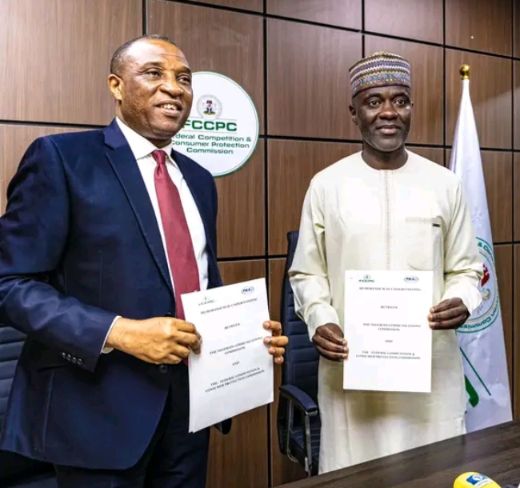
……Dr. Tunji Bello (left), Dr. Aminu Maida (right)
The Nigerian Communications Commission (NCC) and the Federal Competition and Consumer Protection Commission (FCCPC) have come together to protect telecommunication consumers from arbitrary charges.
Chief Executives of the two Commissions, yesterday, January 14, signed a Memorandum of Understanding (MoU) in that regard.
Speaking at the signing process, the Executive Vice Chairman and Chief Executive Officer of the NCC, Dr. Aminu Maida, narrated efforts made that have culminated in the resolve of both the institutions to protect the Nigerian consumer, especially in the communications industry.
“Today, we celebrate the beginning of a strategic partnership between two critical regulatory institutions, each committed to advancing the welfare of the Nigerian people through fair competition and robust consumer protection frameworks.”
According to Dr. Aminu Maida, The telecommunications sector, in particular, has become the cornerstone of Nigeria’s economic and social development, making it imperative for the operators to ensure a level playing field for all stakeholders while protecting consumers who depend on reliable and affordable communications services.
“This MoU is a testament to our shared vision of fostering a transparent, competitive, and consumer-focused telecommunications industry. “By aligning our efforts, the NCC and FCCPC aim to avoid regulatory uncertainty and create clarity for the benefit of all stakeholders in the communications sector and in furtherance of their joint responsibility to ensure the realization of the Federal Government’s Ease of Doing Business objectives.
“Our partnership also highlights the importance of synergy in regulatory oversight. The challenges we face today—whether they relate to market abuses, consumer rights violations, or the complexities of a digital economy—demand a united front and a consistent approach to policy implementation.
“This MoU will ensure that our respective mandates are harmonized to achieve maximum impact.”
He called on all stakeholders to embrace the spirit of collaboration that the partnership represents, adding that Together, they could achieve the goals of innovation, inclusivity and sustainability in Nigeria’s telecommunications sector and beyond.
On his part, the Executive Vice Chairman and Chief Executive Officer of the FCCPC, Dr. Tunji Bello, identified what he called “the interwoven relationship between the Federal Competition and Consumer Protection Commission (FCCPC) and the Nigerian Communications Commission (NCC), saying that this highlights the importance of Section 105 of the Federal Competition and Consumer Protection Act (FCCPA) 2018, which explicitly provides for cooperation and collaboration between the FCCPC and sector regulators.
“This synergy is critical to ensuring comprehensive oversight and consumer protection without regulatory conflicts or duplications.
“By this, we are also making life easier for the generality of consumers in dealing with two government agencies on the same issue at the same time.
“The signing of this MoU today symbolises the convergence of two diligent government agencies in compliance with legal requirements to eliminate regulatory gaps in the telecoms industry.
Dr. Tunji Bello is sure that this partnership will benefit both operators and consumers as well as foster harmonious collaboration between the two Commission; streamline operations for telecoms operators through a one-stop-shop approach in many instances, and ensure robust consumer protection, fair competition, and the eradication of exploitative practices.
“This is entirely consistent with President Bola Tinubu’s vision of fostering economic growth through regulatory collaboration, enhanced market efficiency, and prioritising consumer welfare.
“Given the importance of this legal requirement, today’s event should inspire other sector regulators to establish similar collaborative frameworks with the FCCPC, as mandated by Section 105 of the FCCPA. This will ensure that consumers across all sectors enjoy the benefits of coordinated and comprehensive regulatory oversight.”






